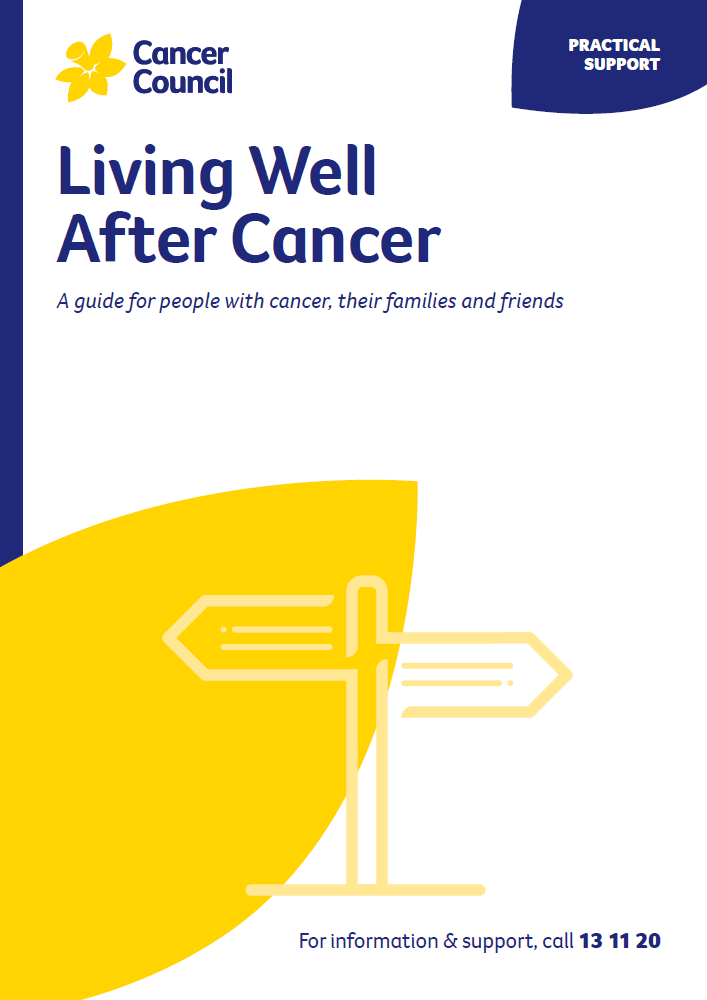- Home
- About Cancer
- Living well
- Living well after cancer
- Managing side effects
Managing side effects
It can take time to recover from the side effects of cancer treatment. Side effects can be both physical and emotional, and impact on your ability to return to your usual day-to-day activities. Talk to your doctors about any side effects you have so you can develop a plan to manage them.
We outline some side effects common to cancer survivors and offers suggestions on how to cope with them. For more information and support, call Cancer Council 13 11 20.
Learn more about:
- How long side effects may last
- How complementary therapies can help
- Sleeping problems
- Fatigue
- Pain
- Lymphoedema
- Changes in thinking and memory
- Tingling or numbness in hands or feet
- Other common cancer-related effects
- Changed body image
- Impact on sexuality and initimacy
- Menopause
- Fertility issues
How long side effects may last
Some treatment side effects go away quickly; others can take weeks, months or even years to improve. Some may be permanent. Most side effects can be managed with support from your health care team. Your body will cope with the treatment and recovery in its own way. It is important not to compare yourself to others.
Some people experience late side effects. These are problems that develop months or years after treatment finishes. They may result from scarring to parts of the body or damage to internal organs. Talk to your doctor about whether you are at risk of developing late effects from your treatment and what you can do to help prevent them.
Managing the side effects of treatment can feel overwhelming, but there are many sources of support.
Side effects after cancer treatment often relate to the type of cancer and the part of the body treated, so it can be useful to read information about the type of cancer you had treatment for. For more details about a specific cancer, search for the cancer type.
→ READ MORE: How complementary therapies can help
Podcast for people affected by cancer
Listen now
More resources
Prof Michael Jefford, Medical Oncologist and Director, Australian Cancer Survivorship Centre, Peter MacCallum Cancer Centre, VIC (clinical review); Lucy Bailey, Nurse Counsellor, Cancer Council Queensland; Philip Bullas, Consumer; Dr Kate Gunn, Clinical Psychologist and Senior Research Fellow, Department of Rural Health, University of South Australia, SA; Rosemerry Hodgkin, 13 11 20 Consultant, Cancer Council WA; Prof David Joske, Clinical Haematologist, Sir Charles Gairdner Hospital and Clinical Professor of Medicine, The University of Western Australia, WA; Kim Kerin-Ayres, Clinical Nurse Consultant, Cancer Survivorship, Concord Hospital, NSW; Sally Littlewood, Physiotherapist, Seymour Health, VIC; Georgina Lohse, Social Worker, GV Health, VIC; Melanie Moore, Exercise Physiologist and Clinical Supervisor, University of Canberra Cancer Wellness Clinic, ACT; June Savva, Senior Clinician Dietitian, Nutrition and Dietetics, Monash Cancer Centre, Monash Health, VIC; Dr Elysia Thornton-Benko, Specialist General Practitioner and Research Fellow, University of New South Wales, NSW; Prof Janette Vardy, Medical Oncologist, Concord Cancer Centre and Professor of Cancer Medicine, The University of Sydney, NSW; Lyndell Wills, Consumer.
View the Cancer Council NSW editorial policy.
View all publications or call 13 11 20 for free printed copies.

